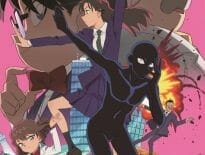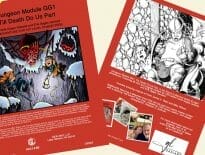Welcome home.
This is Audio EXP for the 28th of January, 2023, and the episode title is “Have we doomed D&D to NFTs?”.
[The following is a transcript of Audio EXP: #182]
[Also on Stitcher | Spotify | Apple | Google]
Catilus is in the Spotlight this month, as voted for by Patreons.
There’s an interview on the blog with the talented illustrator; in it, we talk briefly about stereotypical art in fantasy RPGs. Should we strive for something other than rescuing the princess in distress when we bring gamebooks to life with art?
Last week the podcast was dominated by Dungeons & Dragon’s Open Game License drama. In this week’s short podcast, the same is true.
I said last week that while Wizards had given concessions, the underlying issue remained and that one side would have to back down. WotC now has, all the way, leaving the OGL untouched.
Furthermore, the Systems Reference Document 5.1 will be a full Creative Commons License, and third-party publishers can pick which they use.
There are some details to work out, and I think Wizards of the Coast have done a brave thing. It’s a shame they didn’t always see so clearly, but perhaps they did; perhaps they now say ‘Told you so’ to their corporate overlords in Hasbro.
It’s speculation.
Hasbro, this week, announced that Eric Nyman would leave the business. He’s not just the Chief Operating Officer but also Hasbro’s President, and he’s going. 15% of the company’s global workforce will be laid off.
Hasbro’s problems are with their ageing lines; titles like Transformers from the company struggle to make enough money. I now wonder whether Wizards of the Coast is not doing the Transformers tabletop RPG themselves because there are managers in Hasbro who aren’t fans of the more successful colleagues in the WotC unit.
But let’s get back to D&D. There were a few potential titles for this podcast.
One was whether D&D can now become a fantastic showcase for Creative Commons and commerce coming together as an exemplar of business, which captures public attention in a way that Linux never did.
To meet targets that’s the challenge Wizards now faces. I hope they succeed, and I say that not out of loyalty to Wizards of the Coast but because I want the Creative Commons offer to work.
Another potential title for this podcast was that D&D 7 is now more likely. The next D&D, One D&D, so-called to avoid being D&D 6 and try and draw the editions war to an end, is still all to play for. If WotC is calling the SRD 5.1, then perhaps the community will call it D&D 5.1.
However, if Wizards can’t make it a commercial success and therefore need a whole set of new rules not part of the OGL or Creative Commons, they’ll have to do a new edition and start afresh. That new edition will be D&D 7.
What will make One D&D a commercial success? D&D Beyond will. That’s another angle for future podcasts. If D&D is Creative Commons, Wizards must get its money through things people need to pay for, and the subscription model will be their preferred route. D&D Beyond is appropriately named. D&D is free. Money comes from the company going beyond D&D with D&D Beyond.
But, no. The title of this podcast is about doom.
I’m clearly a worrier.
In an earlier podcast, I looked back and guessed that if WotC had wanted to edit or tweak the OGL simply to lock out NFT businesses, then the community might have cheered them on.
That didn’t happen. Instead, the protections to the OGL and Creative Commons offer might make NTF attempts more likely, though I note there are flavours of Creative Commons, and most don’t allow unabashed commercial mockery.
To take a step back and explain the connection between D&D and NFTs, it works like this. NFTs are tokens that are unique to people, and they point to things and are loaded with problems, one of which is the misunderstanding about what owning an NFT actually lets you own. You don’t own what the token points to, just the token.
NFTs must be kept alive by the internet constantly burning resources, so they’re not very green. They’re worth no money unless someone else is willing to buy them from you, so are a bit like stock market bets.
The D&D connection is that there have been attempts to make D&D-based computer games in which NFTs can be traded or given a reward. This means the people charging you money to play, or letting you do it for free, can weave NFTs into it – such as tokens pointing to character sheets, or in-game loot, or out-of-game access to worlds and scenarios. The game helps ensure people are always willing to buy those NFTs, so the NFTs always have value.
Whether Wizards of the Coast’s newfound dislike of NFTs comes from ethical concerns or the belief that only they should get to weave NFTs into D&D isn’t known.
We may find out. If D&D Beyond offers enough lure to the game, if the subscription to D&D works out for WotC and Hasbro, then they may never flirt with the idea, as they once seemed to, of doing NFTs. In fact, third-party D&D NFT games might never take off.
So, I can answer the podcast headline question – has the OGL community victory doomed D&D to NFTs? No. It’s not a sure thing. It has undoubtedly changed the commercial model around D&D, though, making subscription fees, virtual playspaces and ancillary projects more likely through necessity.
Just one last thing on this before we look to see if any other news got through this week. Previously, we had surveys showing many D&Ders didn’t want to give WotC any more money. I’m already seeing people saying they will now continue to play D&D but won’t ever give money to D&D Beyond.
A more recent survey shows that 80% of US Millennials see their digital identities as important to them.
So, what do you think? What does the Creative Commons and untouched OGL mean for the commercial future of D&D? Is D&D 7 now more likely, rather than the evolution of One D&D as once imagined? Will NFTs and other proxies and gambles float in to extract cash from the community?
Also flirting, I think, with heated debate is Fat Goblin Games. They’ve brought out a suggested Tabletop Roleplaying Game Content Ratings System.
It’s not a thing I’d ask for. I think RPGs span many different cultures and that the way that means one system can’t apply to many different buyer types. For example, Europeans see sex is too different from the way Americans do to enable a single system. But I don’t see the harm in the attempt, and I appreciate that some gamers might appreciate a badge on a book, virtual or otherwise, to indicate a game is intended for mature readers. That might be a reason to buy it or avoid it.
A far safer proposition is Nord Games’ The Oracle Character Generator.
This is a Kickstarter that’s about $150,000 deep in pledges, with three weeks still to get more.
It’s a card-based system to mix and match lots of prompts to help come up with PC or NPC concepts.
There are some freebies discussed on the Geek Native blog too. One is Siegebreaker Games’ Shattered World Introduction Guide.
That’s a 5e-powered post-apocalyptic world of guns and magic, in which portals opened to let demons and others into Earth.
There’s Raven God Games’ Pay What You Want Reaver quickstart. Raven Gods suggest you pay nothing for their 92-page intro into a grim sword and sorcery setting and unique rule set.
I called out three bundles and mentioned a fourth in the RPG news summary.
There are two at the Bundle of Holding; the first is Advanced Adventures which is a mega bundle of scenarios from Expeditious Retreat Press and the second is the return of 0One Dungeons. If you need loads of interactive battle maps, that’s your ticket.
The call-out was for the Itch-hosted Solo but not Alone, which is the third year that the Jasper’s Game Day supporting bundle has run.
On Humble and from Kobold Press, there’s RPG Worlds.
One last thing, if you want to be part of the Gygax family history, you can go to Heidi Gygax’s own wedding reception by securing the limited to 1 person top tier of the Till Death Do Us Part Kickstarter. You’ll also get Heidi and her soon-to-be-husband’s own 1e and 5e compatible dungeon crawl.
So, let’s finish there; enjoy your week and keep safe.
Do you have any thoughts on this article? Let us know in the comments below.

